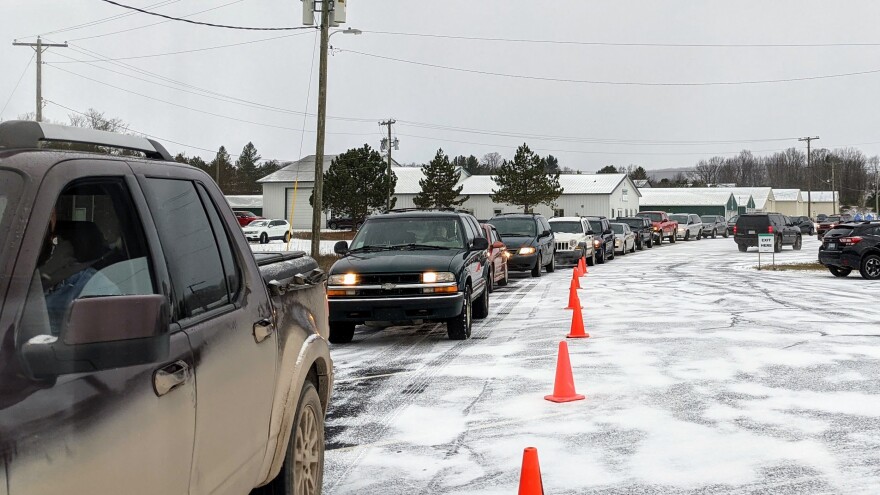When winter hits northern Michigan, there’s usually a bump in the number of people who don’t know where their next meal will come from. But this year, the pandemic has made food insecurity in the region much worse.
Manna Food Project, a food bank that serves Antrim, Charlevoix, and Emmet counties, provided groceries for over one hundred households at their Harbor Springs location this week. That’s the highest number of clients they’ve seen in months.
Jessyca Stoepker, who works with the nonprofit, spoke with Interlochen Public Radio about the rise in need she’s seen over the past few weeks. This is an excerpt from the conversation.
IPR: Is the level of need you’re seeing right now different than what’s typical during this time of year?
JS: Yeah, typically winter always brings a little bit higher numbers. It usually means seasonal layoffs, higher heating bills, people have car troubles and just general struggles in the wintertime.
But right now, everything is compounding at the same time with COVID-19. And more than ever, we’re seeing families and individuals who have never asked for food assistance before, they’ve never been to a food pantry, they don’t know what to do. They were probably on the brink of catastrophe for a long time. And now, the pandemic has just tipped them over the edge.
IPR: Have you seen this heightened food insecurity throughout the course of the pandemic, or is it only more recently, with all the hardships that winter can bring?
JS: At the onset of the pandemic, for about three months there, our food insecurity numbers were really high. All of the food pantries that we supply to were reporting higher numbers of clients, as well as in our immediate service area.
But as the summer approached, the number of cases went down and also food security went up. A lot of people were able to get part-time jobs. We saw our numbers return to normal—almost calm. It was the calm before the storm.
As Thanksgiving approached, probably about three or four weeks before Thanksgiving, things got really bad again. Now we’re serving way more people than we ever thought, especially new people who have never been here before.
What are some of the reactions from people who are visiting the food bank for the first time?
When I’m registering folks who are coming in for the first time, I open the little window in our kiosk and I ask them the basic questions. We don’t require any proof of income or anything like that, we just take our clients at their word. So that really helps make it a quick and easy process.
But there’s been a few times where their voice cracks, as they tell you their name and why they’re here. It’s kind of traumatic to be in a place where you don’t know where your next meal is going to come from. They’re probably scared. We try to make the process as easy as we can for them.
What are you hearing from people about how the pandemic has led to food insecurity? Do any stories stick out?
One immediate effect is obviously restaurants and other small businesses closing their doors for an extended period. But there’s a lot of indirect causes and effects.
Suddenly during a pandemic, you can’t carpool with your co-workers any more, your ride to work is eliminated. Your small business tanks because no one wants to come into your store. You’re staying home watching your kids since school’s closed. You can’t afford to pay a babysitter every day, so you have to quit your job. You have to double the amount of food you cook each day because your kids are home. It’s an ongoing spiral.
And most of us in northern Michigan—nearly 50 percent—are just one emergency or accident away from being on a survival-mode budget. We don’t realize it until it’s too late.
These are all true stories that I’ve heard before. And they’re the true stories of families somewhere in our community.


